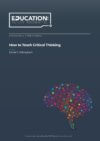The Australian Curriculum acknowledges that developing thinking skills is a primary purpose of education, and identifies critical thinking as an important capability for the 21st century. Critical thinking has, of course, long been a valuable skill for young people to master, though its importance is expected to increase as the world becomes ever more augmented by artificial intelligence and other emerging technologies. Despite consensus on the need for critical thinking, there is still considerable debate over how it is learned and, subsequently, how education can best support students to develop critical thinking capabilities. Some believe that critical thinking can be taught as a generic skill independently from subject content, while others contend that content mastery is pivotal to the development of thinking capabilities. This paper considers what cognitive science can tell us about how critical thinking is acquired, and the implications for how education might best develop young people’s critical thinking capabilities in light of this evidence.
The author concludes that scientists are united in their belief that content knowledge is crucial to effective critical thinking. Scientists are somewhat divided as to whether critical thinking is best characterised as a large number of more specific skills or a smaller number of more generic skills. The author argues that the latter is not a fruitful way to conceptualise skills in education, however, as there is little theory to guide how to teach generic skills. The author recommends a four-step process to develop a program to teach critical thinking: (1) identify a list of critical thinking skills for each subject domain; (2) identify subject matter content for each domain; (3) plan the sequence in which knowledge and skills should be taught; (4) plan which knowledge and skills should be revisited across years.



Responses